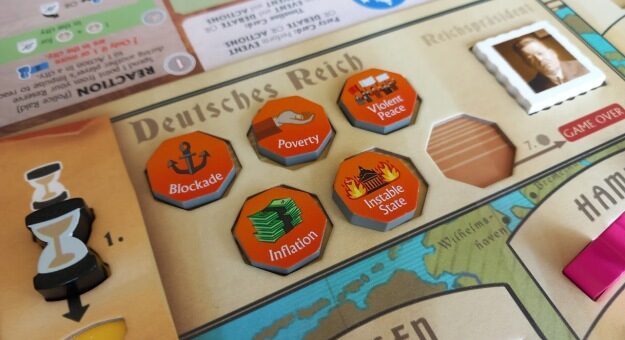
Back to the question: Which agenda cards should you select in the first round of a game of Weimar: The Fight for Democracy (Matthias Cramer, Capstone Games/Skellig Games/Spielworxx)? We’ve done this for the Social Democrats (SPD) and the Communists (KPD), today, we’re doing the Conservatives (Zentrum)! After a quick overview of the purpose of selecting agenda cards and the situation of the KPD, we’ll hop into the ranking. Let’s go!
What Do Agenda Cards Do?
Each player selects one of their four agenda cards for each round of a game of Weimar. You can re-use agenda cards as often as you want – so you could play a full game of six rounds selecting the same card six times, but it is typically best to vary your selection according to – in order of importance – your strategic objectives, the situation on the board, and the cards you’ve drawn. Agenda selecting happens after you’ve drawn timeline cards, but before drawing party cards.
Each agenda card does a few of the following things: Adding new sets of cards to your draw deck, placing issues on the opinion track, giving you a little more of the game’s various “currencies”, or providing a unique bonus. Let’s have a quick look at each:
Card sets: Each party has two cards which add a five-card set to their draw deck. One of the sets has several cards that provide victory points (VPs), the other focuses your party on another goal. Cards from the additional sets have more action points than those from the base deck on average, but are typically not as flexible to use for the event. As you only have twelve cards in the deck initially (and draw at least three per round), inserting the decks at the right time to make the most of the cards (either before or after the reshuffle in a longer game) is crucial.
Issues: Most of the issues on the opinion track are placed via agenda cards. The right card can thus be your ramp to changing the board state in your favor, to taking over a minor party from a competitor, or to improve your fate in the long run… or, at least, to distract the other parties. In the worst case, you select an issue which potentially benefits a competitor and they win it in the arena of public opinion, thus making you worse off than before!
Currency: It’s always welcome to have a little bit more of something. Many agenda cards give you (in general order of awesomeness) an additional card, a marker on the society track, a seat in parliament, a party base in a city, or an action point in the reserve.
Unique Bonuses: Too many and too specific to go into detail here, the unique bonuses cover everything from conducting a free action to looking at the other players’ timeline cards.
The Situation of the Zentrum in 1918
At the beginning of the game, the German Revolution has just swept the monarchy away. The Zentrum is the junior party in the new republican government (led by the SPD) and has the second-most party bases in the cities as well as seats in parliament. The republic, however, faces challenges from all sides: The economy is in shambles, there is no peace treaty for World War I yet, and extremists are in armed rebellion against the government. There is no guarantee the nascent republic will survive – in game terms, it might descend into anarchy (and thus end the game) after the first round!
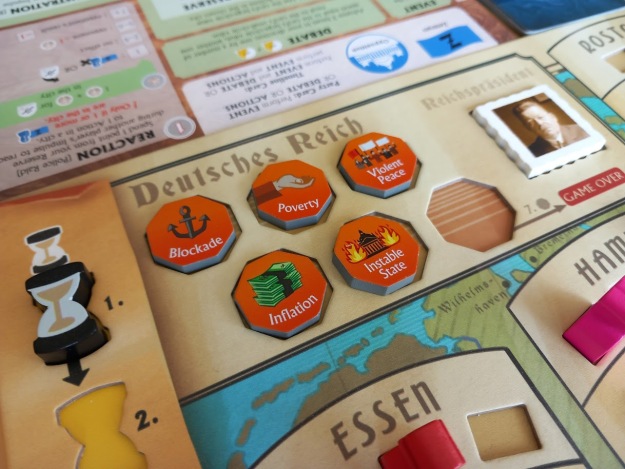
You will need to resolve as many of these crises as you can in the first round: An anarchy game end will penalize you with -8 VPs (thus likely taking all the VPs you might have won before). If the republic survives, fewer crises mean more VPs for you. The same incentives apply for your government partner SPD, so you are advised to cooperate closely in the first round (later, jealousies, especially on the part of the Zentrum, might force you apart).
Together with the SPD, I would strongly advise to get the following things done:
- Improve the economy by at least one step
- Negotiate the Treaty of Versailles
- Clamp down on extremist units and markers in the cities
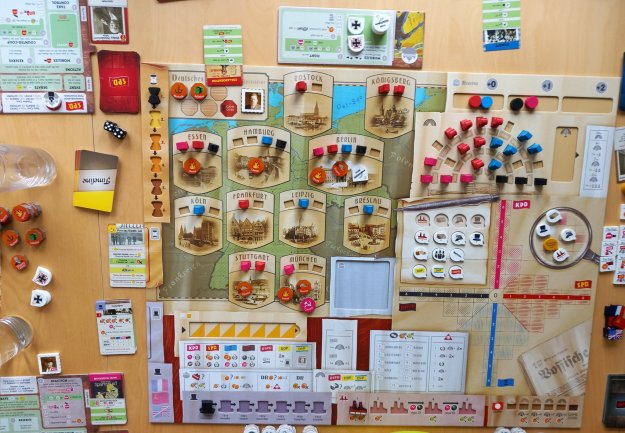
All of these can be done by getting the respective issues (Economy, Foreign Affairs, Security) into play and winning them. Prospects for solving the problems with actions/card events are more mixed:
- There are timeline cards which affect the economy (typically, but not exclusively, for the better in the first rounds). Of course, you’re not guaranteed that anyone draws them, so don’t count on that.
- You can conduct Foreign Affairs as an action, but without at least one flag counter to give you a bonus die it is pretty risky on the first round. If you can get a flag into play first (by another event), if there is no Foreign Affairs issue in play or if it seems like the Foreign Affairs issue will be won by an opposition party, go for the action!
- City actions are absolutely crucial to keep the extremist parties at bay: Soften them up with Fight (giving yourself more breathing space in rounds to come as well), break their markers up with Counter-Coup!
With that in mind, on to the ranking!
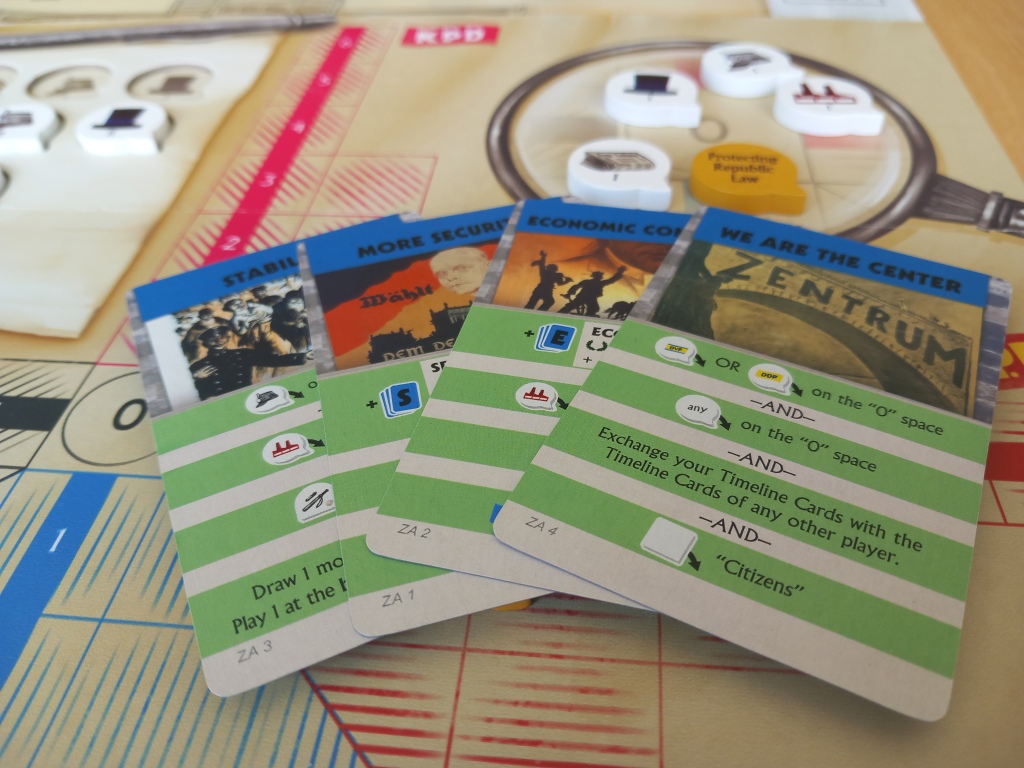
4: We Are the Center

Let’s start with the best thing about this card on round 1: The Zentrum-aligned Citizens marker gives you an additional seat in parliament as long as it is active. Pretty good, particularly as you are likely to lose seats in parliament as long as you are in government.
The unique bonus of exchanging timeline cards allows you to share information with another player – usually not more, as the timeline cards are pretty balanced in their effects, so you’ll likely not have the opportunity to send off something unpleasant to another player. Not too great.
Finally, while placing any white issue is nice and flexible, the DVP or DDP issue is actively detrimental to the Zentrum on round 1: You don’t want to place the DVP as it is already aligned with you, so you only stand to lose from it, and placing the DDP puts pressure on your government partner SPD which controls the DDP initially. That means that you might engage in a lot of fruitless debating over the DDP which strengthens only KPD and DNVP. I’m all for challenging the SPD as the Zentrum, but if you start that kind of behavior on round 1, chances are that the republic will fall to pieces over your squabbling.
3: Economic Competence
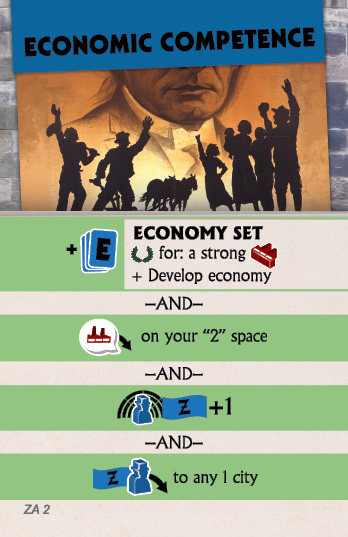
This is your card with which to score VPs! …but not on round 1. The events from the Economy deck reward a strong economy (typically requiring an economy level of 3 or 4 to give you VPs), and it’s unlikely you’ll reach that on round 1. I’d consider this on round 1 if I had drawn two timeline cards which both improve the economy (pretty unlikely). Otherwise, not really – the VP events are just too important to mistime like this.
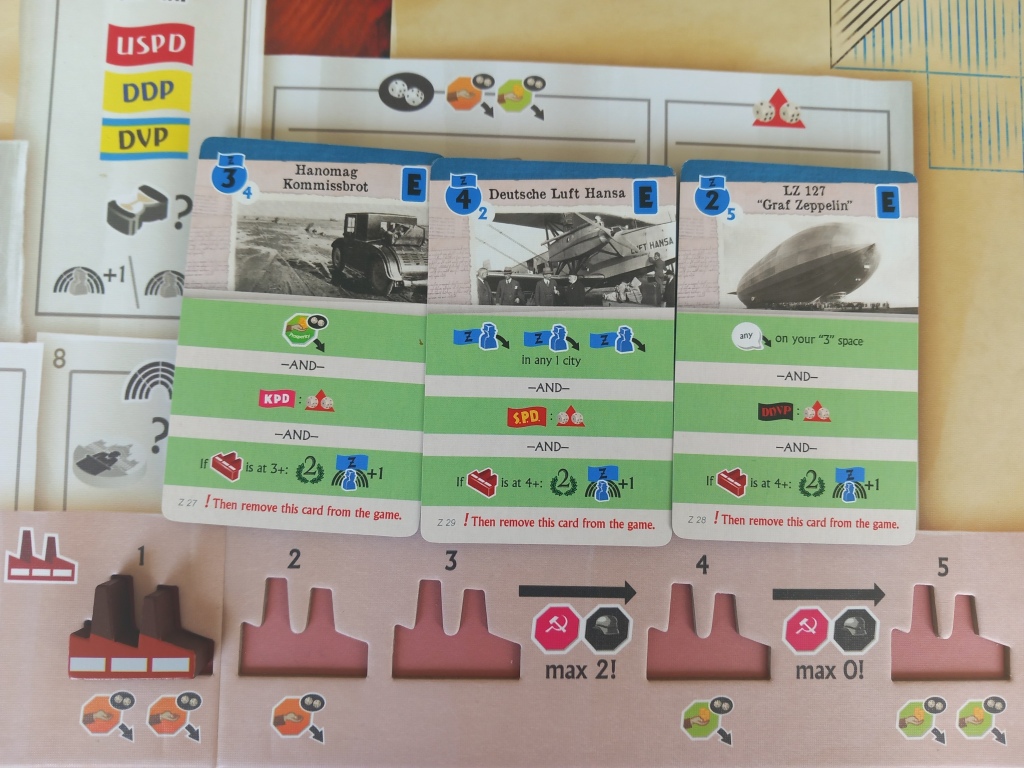
That’s a shame, because everything else on the card is straight up great: The cards from the Economy set have great values (especially big-circle values, in which the Zentrum normally is rather weak). Getting both a seat in parliament and a party base in a city can help stem the typical early erosion of the Zentrum, and the Economy issue in a favorable spot is always welcome (both for improving the economy and for its likelihood to give you additional seats in parliament for winning enough issues).
So: Great agenda card… but I’d typically save it for round 2 or 3.
2: More Security
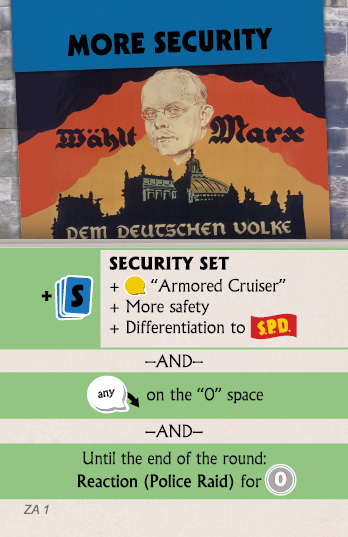
The second agenda card which adds a new card set – and most of its events are pretty useful on round 1 to clamp down on unrest and Communist threats. You should put some police units on the board early to use your free Reaction ability often (but then again, you should do that anyway as the Zentrum on round 1).
While placing any one white issue on the opinion track is always welcome, it is only one – and you have so many things to do in the beginning and would love to bring Foreign Affairs, Economy, and Security into play (or have them brought into play by another player, likely the SPD). Thus, I’d select More Security only if I had another way to take care of one of these issues – for example, if one of my Timeline cards allowed me to place a flag (so I could conduct Foreign Policy with an action and a decent chance for success), or if a Timeline card improved the economy.
Now, of course, you ask, is there an agenda card that gets two crucial issues into play? – Yes, yes there is!
1: Stability
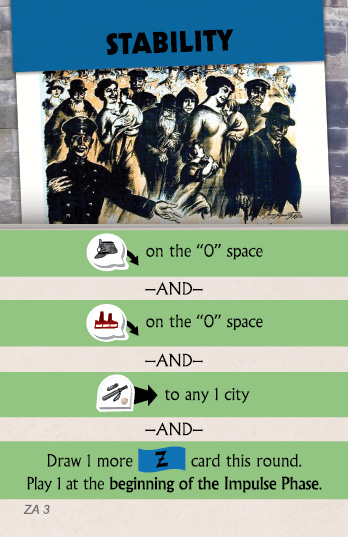
Stability is just an all-round amazing agenda card. It places two essential issues for round 1 (Security and Economy; you can usually rely on the SPD to place Foreign Affairs either with the Collaboration agenda directly or as an “any white issue” with the Opposition agenda card).
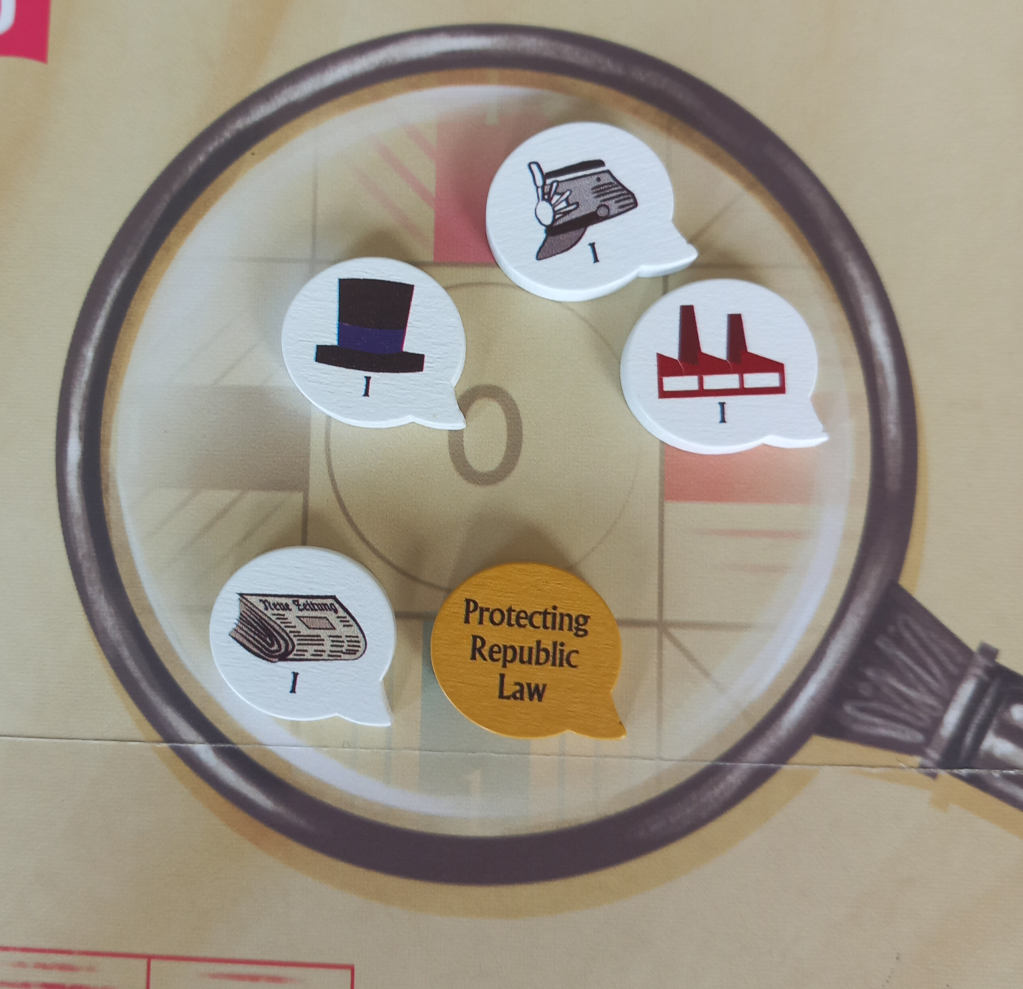
It also gives you an additional Party card – so you’ll have four instead of three, a massive boon. Moving a police unit before the game begins (for example, to the Communist hotbed of Munich) is just the cherry on top.
This is also a great card looking at the second round: If you play the agenda in both rounds, you will draw eight of your twelve initial Party cards, plus up to three from reactions with politicians which allow you to draw a replacement card. That makes it very likely to draw the End of Hyperinflation Party card, which allows you to deal with the inflation threat markers without having to win the Rentenmark issue.
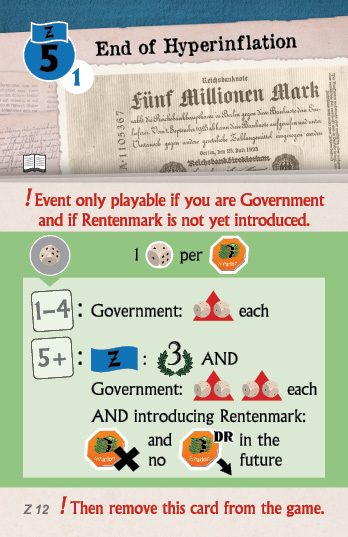
I’d select Stability in most games as my first agenda cards – and you will likely select in future rounds as well every once in a while, at least once your additional card sets are in play.
What is your favorite agenda card for the Zentrum on round 1? – Let me know in the comments!